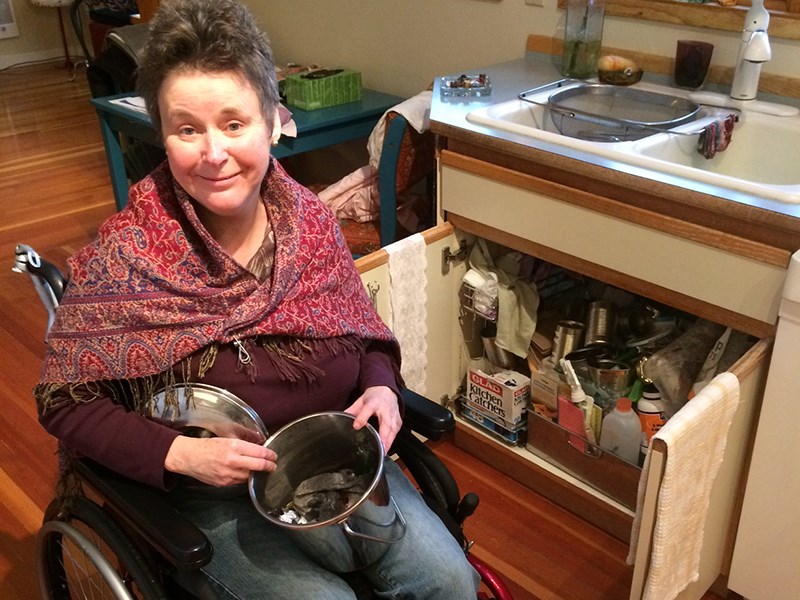As we prepare to welcome the new year, Let’s Talk Trash wants to share an inspiring local story about Powell River resident Jody Copley, who challenged herself to reduce her waste and took it to the next level.
Inspired in part by the award-winning documentary, The Clean Bin Project, where partners and filmmakers Grant Baldwin and Jen Rustemeyer go head to head in a competition to see who can swear off consumerism and produce the least garbage, Jody set her zero waste goal for 2019. It was the connection between consuming less equaling producing less garbage that really clicked.
Jody didn’t grow up in a zero waste household, she grew up in a house with six kids who produced three large garbage cans a week. Before her zero waste year, Jody was already recycling, composting, buying in bulk and bringing her own bags and mugs, so what does next level look like to someone like Jody?
She refused to buy items she used to consume such as organic bananas when they came encircled in sticky plastic tape. She stopped eating ice cream because even though the packaging is recyclable in the Recycle BC program it still requires transport and consumes energy.
Jody, who is vegetarian, also reduced her yogurt and cheese intake dramatically due to the packaging. You can bring your own container to get cheese at the deli, however, grocery store staff members are required to use plastic gloves or weigh the cheese on butcher paper or a plastic liner, which then becomes garbage.
If Jody did acquire a plastic container she brought it to Ecossentials for others to use for bulk goods. When she travelled and accumulated any waste, she brought it home with her. This includes bringing home a tea bag from a restaurant that doesn’t compost.
Although refusing and reducing feels like you have to give up some of the things you love, Jody said she sees living with less as an opportunity to live more gently in the world and the experience has taught her new skills and connected her with others.
Here are some of the ways Jody went from creating 1/16th of a grocery bag of garbage in a week to creating 1/16th of a grocery bag of garbage in a year:
- Participated in a clothing swap where items were given and received
- Learned new skills such as mending clothes
- Shopped at the local farmers’ market (she brought her own bags for lettuce and other vegetables)
- Refilled soap containers and hummus from a local vendor
- Cut plastic bags instead of ripping them so they could be reused over and over
- Composted everything that is compostable including dust and hair
- Avoided food waste, including not peeling vegetables like carrots
- Borrowed magazines, books and movies from Powell River Public Library
- When giving things away she made sure the recipient wanted the item, so it didn’t become waste in another household
- Had new lenses put in her old frames instead of buying new glasses
- All yard and garden waste was put back into her yard to build soil
- Frequented restaurants and coffee shops that buy locally and compost their food waste
- Placed a sticker on her door to refuse junk mail
After a year of habit changing, Jody’s year-long challenge is more than a resolution, it has become a lifestyle.
“Taking the zero waste challenge wasn’t hard after a few months when I got the mindset for garbage waste and recycling,” said Jody. “Now it is harder to make garbage than not.”
Her three R’s are Refuse, Reuse, wash and Reuse again.
Let’s Talk Trash is qathet Regional District’s waste-reduction education program.



